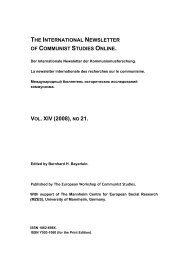11RXNdQ
11RXNdQ
11RXNdQ
You also want an ePaper? Increase the reach of your titles
YUMPU automatically turns print PDFs into web optimized ePapers that Google loves.
Sartre elaborates on the systemic violence of colonialism in his preface to Albert<br />
Memmi’s The Colonizer and the Colonized. 3 He is careful to differentiate between the<br />
subjects of ideology and of colonialism, between the insidious function of the former and<br />
naked systemic violence of colonial oppression. He captures the terms of the dialectics of<br />
having and being thus: ‘Colonialism denies human rights to people it has subjugated by<br />
violence, and whom it keeps in poverty and ignorance by force, therefore, as Marx would<br />
say, in a state of “sub-humanity”’. Racism is inscribed in the events themselves, in the<br />
institutions, in the nature of the exchanges and the production. The political and social<br />
statuses reinforce one another: since the natives are subhuman, the Declaration of Human<br />
Rights does not apply to them; conversely, since they have no rights, they are abandoned<br />
without protection to the inhuman forces of nature, to the “iron laws” of economics’ (this<br />
volume, p. 50). He reiterates the crux of his argument in ‘Colonialism is a System’; he<br />
elaborates on the dialectical relationship involving the oppressor and oppressed first<br />
discussed in his Anti-Semite and Jew and Black Orpheus: ‘A pitiless reciprocity binds the<br />
colonizers to the colonized, their product and their destiny’ (p. 53). He presents the<br />
colonizers and their victims both as ‘strangled by the colonial apparatus, that heavy<br />
machine constructed at the end of the Second Empire, under the Third Republic, and<br />
which, after giving every satisfaction to the colonizers, is turning against them’ (p. 49) to<br />
crush them. He thanks Memmi for reminding us in his book that colonialism carries the<br />
seeds of its own destruction. What Memmi has shown forcefully, argues Sartre, is that the<br />
logic of colonialism would lead not only to the self-destruction of the system, but to the<br />
affirmation of the colonized ‘national selfhood’.<br />
Le Monde approached Sartre to comment on the testimonies of the mobilized reservists<br />
that exposed the issue of torture in Algeria. Sartre wrote an article entitled ‘An Enterprise<br />
of Demoralization’. The article was regarded as an incitement to violence and was<br />
rejected by Le Monde. Sartre published it in Les Temps Modernes with a new title<br />
parodying Jean Nohain’s popular radio programme. Nohain used to present a needy<br />
family and, with the self-congratulatory ‘You are Wonderful’, urge his audience to help<br />
them out. The donations heaped upon this needy family expressed a ‘moment of national<br />
generosity. To the rhythm of Jean Nohain’s weekly miracles, France kept on dreaming<br />
and unwittingly sliding towards the age of consumerism.’ 4 This ‘moment’ was nothing<br />
but a myth. Sartre’s parody serves to demystify the rhetoric of national generosity which<br />
Nohain came to embody by exposing the lies and conceit of the media and cowardice of<br />
the French people for not facing up to the reality of France’s hideous politics. ‘The<br />
newspapers court us’, Sartre writes, ‘they want to make us believe that we are good.<br />
When the radio or the television ask us for a five-franc piece, they call their programmes:<br />
“You are Wonderful”; that is enough to make us run from the Porte de Saint-Ouen to the<br />
Porte d’Italie at midnight. But we are not wonderful. No more than we are naive. The<br />
illusory community of decent people is quite simply that of the readers of France-Soir. If<br />
we refuse to investigate the French truth ourselves, when we are capable of piling up our<br />
old mattresses on top of our 4CVs and throwing them at the feet of some Jean Nohain, it<br />
is because we are afraid. Afraid of seeing our true faces naked’ (this volume, p. 58).<br />
Sartre provides similar insights to those of Barthes in Mythologies: myth works to depoliticize<br />
its signifiers; it hides the truth. ‘Concealing, deceiving and lying,’ Sartre points<br />
out, ‘are a duty for those who inform France’ (pp. 55–6). What is concealed is the fact




